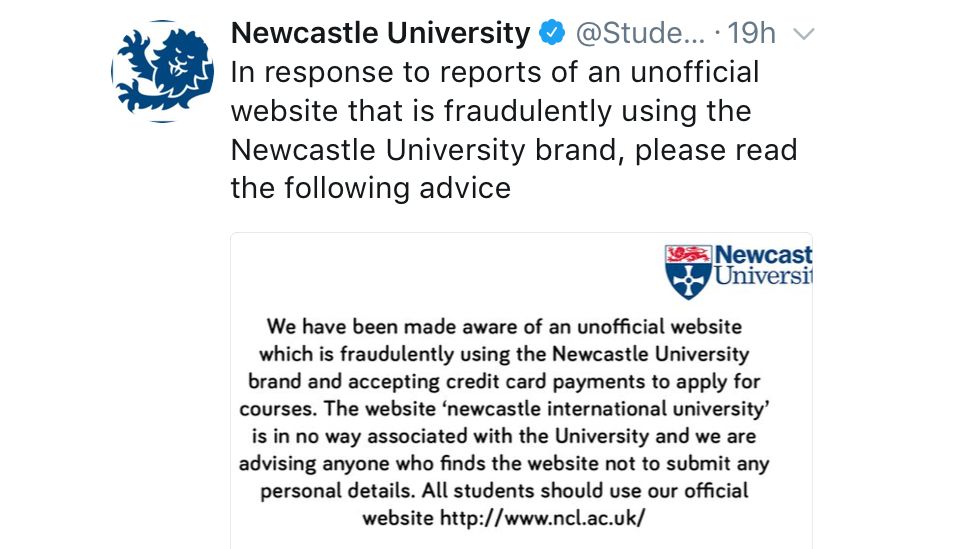Newcastle University students targeted by cyber-scam
- Published

Newcastle University is warning prospective students not to give out personal details on a fraudulent website taking payments for courses.
The fake site uses pictures of Newcastle University buildings and takes payments for a non-existent "Newcastle International University".
It is "in no way associated with the university", warns the university's official Twitter feed.
Students should avoid accessing the site, the university advises.
The site has been described as unusually realistic, but Newcastle International University does not appear on the government's official lists of degree providers in the UK.
'Effective scam'
Azeem Aleem, director of advanced cyber-defence practice at RSA security's Europe Middle East and Africa region, said: "Make no mistake, this is an effective scam.
"They've put in the time and effort to create a remarkably realistic website, and it highlights the very real danger of modern spoofing attacks."
Mr Aleem said the fake site carefully targets overseas students "who may not have the local knowledge to spot the difference between this site and Newcastle University's official site".
He praised Newcastle University for a swift response once the fraudulent site was reported to them earlier this week.
Kirsten Edmondson, head of digital at the university, said the scam came to light when a prospective international student tweeted a question about it.
Ms Edmondson said she was particularly concerned that the site asks for passport numbers and credit card information.
"We would never ask for these details as part of an application," said Ms Edmondson.
New features
Handing them over on this site would leave prospective students at risk of identity theft and losing their money and not receiving any education in return, she added.
She said it was impossible to say whether anyone had handed over personal information - but investigations have shown that the site has been active since 7 July and new features have been added even since it was discovered.
She is particularly concerned that the site is targeting agencies who help pair overseas students with suitable UK courses.
In a statement, Newcastle University said it had reported the site to the internet hosting company and to the internet standards organisation ICANN as well as to the police.
"We proactively announced on social media that this is a fraudulent website and have responded to some student enquiries and will continue to do so. We would urge any students not to access this site and go to our official site: www.ncl.ac.uk or call the university's general number if they have any queries."
Universities UK said fraudulent websites had become less common following international crackdowns.
"It can be difficult for international students to know whether a university advert or link is genuine, so we would advise any prospective students who are not sure to check the official list which includes links to their websites," said UUK in a statement.
- Published20 June 2017
- Published15 June 2017
- Published11 April 2017
- Published13 October 2016